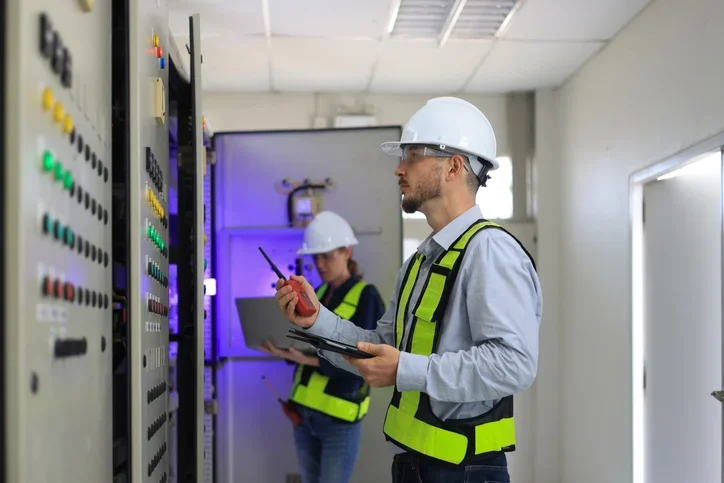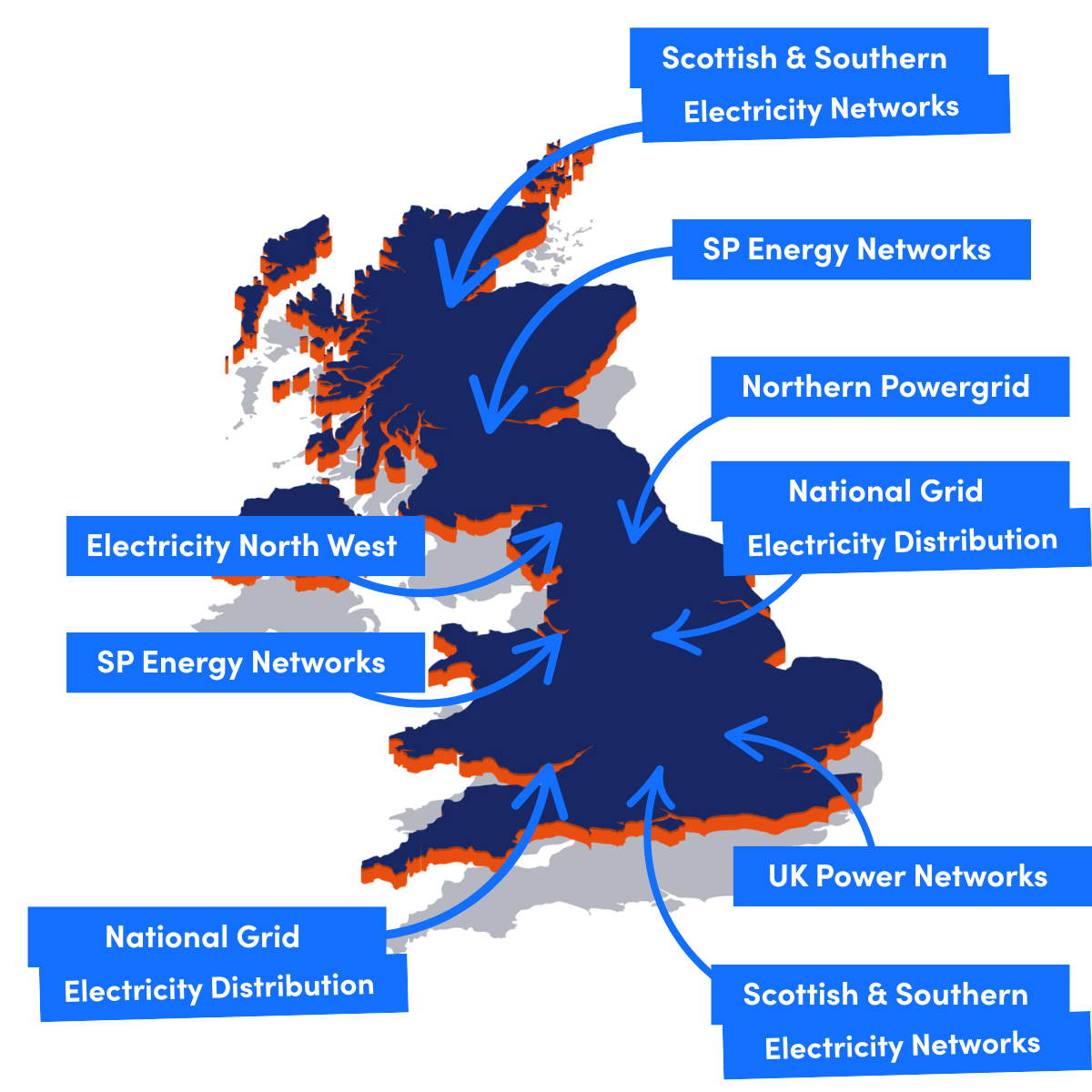Who is your Distribution Network Operator (DNO) and what does it do for your business?
Running a small or medium-sized business means you’re often juggling plenty of responsibilities - from managing cash flow to keeping customers happy. Your electricity supply might not always be top of the list of priorities until you experience an unexpected power cut or need an upgrade for your business premises.
In situations like these, knowing who your DNO is can be a real time-saver. But what exactly is a DNO, and why is it important to know yours?

Our guide covers everything SMEs across the UK need to know about DNOs, including how they differ from your energy supplier, what they do for your business, and how to find yours easily.
What is a DNO?
DNO stands for Distribution Network Operator. Simply put, DNOs are companies licensed to manage and maintain the electricity infrastructure in your local area. They make sure electricity reaches your business safely and reliably, using a network of underground cables, overhead power lines, transformers, substations, and more.
Essentially, you can think of your DNO as the electricity equivalent of your local council tending to the roads — they don’t supply the cars (in this case, the electricity), but they do manage the roads (the network infrastructure) to make sure the traffic flows smoothly.
So, if something goes wrong with the local network — say, a tree takes out a powerline during a storm — it’s your DNO who’ll sort it.
How many DNOs are there in the UK?
There are six main DNOs in the UK, each covering a different region. These are:
- Electricity North West
- Norther Powergrid
- Scottish and Southern Electricity Networks (SSEN)
- Scottish Power Energy Networks
- UK Power Networks
- Western Power Distribution
They’re supported by smaller IDNOs that run embedded networks, often in new-build business parks or industrial estates. So, while you might have an IDNO supplying your site, there’s always a main DNO operating in the background.
What do DNOs do for SMEs?
Distribution Network Operators might not be a term you’re familiar with, but the work they do is vital for small and medium-sized businesses across the UK. Although you don’t directly pay your DNO like you would an energy supplier, they perform several key services that keep your business powered:
- Maintain the electricity network — Your DNO is responsible for keeping electricity cables, transformers, and substations in good working order. Regular inspections, maintenance, and upgrades help reduce power outages and ensure the network is reliable.
- Fixing power cuts — When there’s a power cut in your area, your DNO springs into action to identify and repair the fault. Knowing your DNO means you can quickly report a fault and get real-time updates.
- Connecting new premises or equipment — If you’re expanding your business, moving into a new location, or installing heavy-duty electrical equipment, your DNO manages the process of connecting your site to the electricity network.
- Upgrading local infrastructure — As businesses grow or communities expand, DNOs handle upgrading local electricity infrastructure to meet increased demand, meaning your power supply stays stable.
- Managing safety and emergency situations — DNOs also respond quickly to electricity-related emergencies, such as damaged power lines or equipment failures, to keep people and premises safe.
How to find your DNO by region
In the UK, your DNO depends on where your business is based. The country is divided into several distinct DNO regions, each managed by a different licensed operator.

Here’s a quick summary of the main DNOs by region across the UK:
| Region | DNO |
| North West England | Electricity North West |
| Merseyside, Cheshire & North Wales | SP Energy Networks |
| North East England & Yorkshire | Northern Powergrid |
| Midlands, South Wales & South West England | National Grid Electricity Distribution |
| South East England | Scottish & Southern Electricity Networks |
| London & East England | UK Power Networks |
| Northern Scotland | Scottish and Southern Electricity Networks |
| Southern Scotland | SP Energy Networks |
Why does knowing your DNO matter for your business?
Understanding which DNO operates in your region may not seem important, but it can make a big difference in how smoothly your business runs from day to day. Here’s why it matters:
- Quickly resolving power issues — In the event of a power outage, contacting your DNO directly can speed up repairs and reduce downtime, potentially saving your business from lost productivity and revenue.
- You can plan ahead — If you’re thinking about expanding your operations, installing EV charging points, or upgrading equipment that requires more power, your DNO will provide guidance on timelines, potential costs and network capabilities.
- Helps to budget — Energy prices vary by region, which directly impacts your business energy bills. Being aware of this allows you to factor energy costs into business planning and budget accordingly.
- Efficient communication — Having your DNO’s details to hand helps streamline the process of reporting any faults, arranging infrastructure upgrades, or simply asking questions about your electricity supply.
Why are there energy price differences between DNO regions?
You might have noticed that businesses in different parts of the UK pay slightly different rates for electricity.
The reason for this is something called Distribution Use of System (DUoS) charges. These are the costs your energy supplier pays your DNO for using their local electricity network, which are then passed on to you through your energy bills.
But what influences DUoS charges and, as a result, your energy prices?
- Network maintenance costs — Regions with extensive rural areas typically face higher costs due to longer power lines and the added challenges of maintaining remote infrastructure.
- Population density — Densely populated areas, like towns or cities, spread network costs across many customers, often resulting in lower charges per customer compared to rural regions.
- Local infrastructure investment — Regions that have recently upgraded their electricity infrastructure might temporarily reflect higher charges to cover these investments.
How do DNOs differ from energy suppliers and networks?
It’s easy to mix up all the players in the energy world, but DNOs are actually different from energy suppliers and networks, so here’s a quick breakdown.
- DNOs — Deliver electricity to your premises using local infrastructure.
- Energy suppliers — Sell you electricity, send bills, and manage your account. You can choose your energy supplier, unlike a DNO.
- National Grid — The National Grid operates a high-voltage transmission network across the UK. It balances the country's electricity supply and demand in real time.
- IDNOs (Independent DNOs) — Smaller operators that manage private or new development networks.
Each one has a specific job, but when it comes to your physical electricity connection, the DNO is your go-to.
Can you choose your DNO?
Unfortunately, you can’t choose your DNO since they’re region-based and licensed to operate in specific areas.
Moving premises is the only way your DNO might change if you move out of the region.
Do you need to contact your DNO if there’s a power cut?
Yes, your DNO is responsible for fixing outages and faults on the local network. If your power’s gone, don’t waste time ringing your supplier — go straight to your DNO and report the problem. The contact number for electricity emergencies is 105 — you’ll be connected to your local DNO right away.
They’ll give you updates, investigate the issue, and get engineers out as quickly as possible.
What does a DNO connection involve for your business?
Whether you’re setting up shop or scaling up, getting connected to the electricity network is a big part of the puzzle. Here’s what it usually involves:
- An initial consultation to discuss your needs
- A site survey to assess what’s required
- A detailed quote outlining the costs and scope of work
- Installation by qualified engineers
- Testing and energisation once everything’s ready
Timing and costs vary depending on how complex the work is, so it’s best to get in touch early.
Is DNO responsible for gas as well?
No, electricity and gas have separate networks and operators.
If you’re working on a gas connection or upgrade, you’ll need to speak to your local Gas Distribution Network (GDN) instead.
Find out more about who supplies your business gas with our guide.
Make the switch with Bionic
Your DNO might not be top of mind day-to-day, but when it comes to outages, upgrades, or new connections, they’re essential.
If you need help managing your business energy, comparing tariffs, or anything in between, Bionic is here to help. To compare your business electricity, contact the Bionic energy experts today or find out everything there is to know about business energy with our guides.








